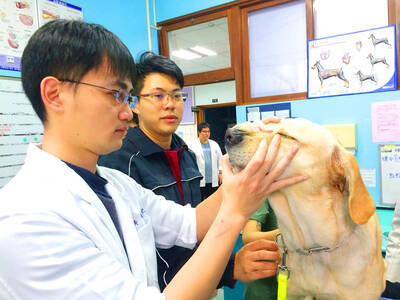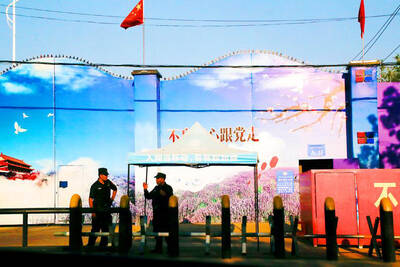As the world again focuses its energies on the climate crisis, Taiwan should do more to achieve carbon neutrality by 2050 to ensure that its products are not marginalized on the global market, Greenpeace said on Sunday.
More than 110 countries have signed on to the global coalition for carbon neutrality by 2050, potentially to be joined by the US after its formal return to the Paris Agreement on Friday.
With the deadline just shy of 30 years away, many countries have been putting forth detailed plans of how they aim to achieve the goal.
For many, carbon taxes are a popular option.
The EU in its European Green Deal plans to draft a proposal for a “carbon border adjustment mechanism” by this year, which would impose a tariff or other restrictions on imports with a heavy carbon footprint, the environmental group said.
In the US, Greenpeace predicted that the new administration would make neutrality the foundation of its next phase of emissions policies to be announced before it hosts a Leaders’ Climate Summit on Earth Day on April 22.
Before he took office, US President Joe Biden also proposed a carbon price on products from countries or regions that fail to meet carbon reduction obligations.
The average Taiwanese produces more emissions than the average Japanese or EU citizen, but the nation is still only committed to its 2015 goal of reducing emissions by half of 2005 levels by 2050, Greenpeace said, citing the Greenhouse Gas Reduction and Management Act (溫室氣體減量及管理法).
This lags far behind the international consensus, the group said, adding that it could have negative implications for the nation’s long-term development and global competitiveness.
Carbon reduction has already shifted from being a simple climate policy to becoming the key to economic competitiveness, Greenpeace project director Cheng Chu-hsin (鄭楚忻) said.
Taiwan should commit to carbon neutrality as soon as possible, and formulate a carbon pricing mechanism that can effectively reduce emissions, she said.
Otherwise, the nation’s exporters could face high tariffs or even lose orders from countries with carbon border controls, Cheng added.
This is to be a critical year in the global fight against climate change, Cheng said, citing the US’ return to the Paris Agreement and the 26th UN Climate Change Conference of the Parties to be held from Nov. 1 to 12 in Glasgow, Scotland.
As the Environmental Protection Administration has said it intends to amend the greenhouse gas act this year, Greenpeace urged the government to take the opportunity to write carbon neutrality by 2050 into law.
It should also create a carbon pricing mechanism that targets major carbon producers, as well as speed up development of renewable energy and energy-saving measures, the group said.
Stimulating the development of a low-carbon economy would create a virtuous cycle that leads to further carbon reduction, it added.

Former Czech Republic-based Taiwanese researcher Cheng Yu-chin (鄭宇欽) has been sentenced to seven years in prison on espionage-related charges, China’s Ministry of State Security announced yesterday. China said Cheng was a spy for Taiwan who “masqueraded as a professor” and that he was previously an assistant to former Cabinet secretary-general Cho Jung-tai (卓榮泰). President-elect William Lai (賴清德) on Wednesday last week announced Cho would be his premier when Lai is inaugurated next month. Today is China’s “National Security Education Day.” The Chinese ministry yesterday released a video online showing arrests over the past 10 years of people alleged to be

THE HAWAII FACTOR: While a 1965 opinion said an attack on Hawaii would not trigger Article 5, the text of the treaty suggests the state is covered, the report says NATO could be drawn into a conflict in the Taiwan Strait if Chinese forces attacked the US mainland or Hawaii, a NATO Defense College report published on Monday says. The report, written by James Lee, an assistant research fellow at Academia Sinica’s Institute of European and American Studies, states that under certain conditions a Taiwan contingency could trigger Article 5 of NATO, under which an attack against any member of the alliance is considered an attack against all members, necessitating a response. Article 6 of the North Atlantic Treaty specifies that an armed attack in the territory of any member in Europe,

LIKE FAMILY: People now treat dogs and cats as family members. They receive the same medical treatments and tests as humans do, a veterinary association official said The number of pet dogs and cats in Taiwan has officially outnumbered the number of human newborns last year, data from the Ministry of Agriculture’s pet registration information system showed. As of last year, Taiwan had 94,544 registered pet dogs and 137,652 pet cats, the data showed. By contrast, 135,571 babies were born last year. Demand for medical care for pet animals has also risen. As of Feb. 29, there were 5,773 veterinarians in Taiwan, 3,993 of whom were for pet animals, statistics from the Animal and Plant Health Inspection Agency showed. In 2022, the nation had 3,077 pediatricians. As of last

XINJIANG: Officials are conducting a report into amending an existing law or to enact a special law to prohibit goods using forced labor Taiwan is mulling an amendment prohibiting the importation of goods using forced labor, similar to the Uyghur Forced Labor Prevention Act (UFLPA) passed by the US Congress in 2021 that imposed limits on goods produced using forced labor in China’s Xinjiang region. A government official who wished to remain anonymous said yesterday that as the US customs law explicitly prohibits the importation of goods made using forced labor, in 2021 it passed the specialized UFLPA to limit the importation of cotton and other goods from China’s Xinjiang Uyghur region. Taiwan does not have the legal basis to prohibit the importation of goods